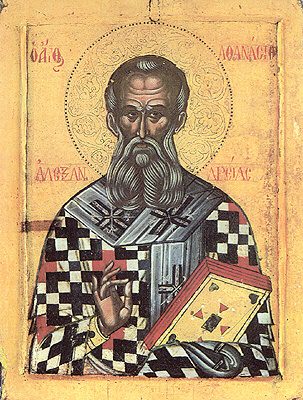
St. Athanasius (298-373 a.d.)
“a small thin man with a beautiful face, piercing eyes, and a mysterious aura of power which affected even his enemies.”* To such a man as this the church today owes a long-forgotten debt of gratitude. Athanasius, the bishop of
This small book (72 pages in my copy) warmly and systematically sets forth the Christ of Scriptures. Athanasius begins in the garden of Eden, proving from man’s fall why it was necessary for Christ to come as a man: God had set His image in man and He would most be glorified by restoring and reviving that image, which could only be done by one like us, indeed one of us. It was impossible, therefore, that God should leave man to be carried off by corruption, because it would be unfitting and unworthy of Himself.
Through many short chapters, Athanasius begins to reveal the greatness of Christ through this amazing act of sacrifice and obedience. How great is the love of God, who would come as man, Creator coming as creation because of love! It’s hard to imagine anyone reading these beginning chapters without having a spring of awe and love well up within them for this Christ: For by the sacrifice of His own body He did two things: He put an end to the law of death which barred our way; and He made a new beginning of life for us, by giving us the hope of resurrection.
It was our great and terrible condition which made the incarnation necessary. It was the greatness of Christ’s love and the truth of His divinity which made it work. For so many parts of the Christian walk – our identity, discipleship, honor, purpose & mission – for all this, Christ’s incarnation is key. And for the incarnation, His Godhood is paramount.
Christ came as a man to be visible to us in our weakness of faith. His miracles proved His divinity, His presence the very revelation of God (
Athanasius then gives time to answer the arguments of the Jews and the Greeks against Christ’s deity and resurrection. For the Jews, he proves Christ’s divinity from the Old Testament (Isaiah 53 in particular), from His miracles in their midst, from the perfection of His fulfillment of David’s reign. For the Greeks, he shows how reasonable it was for the Word (logos) to be made flesh – even how being made flesh was the key to the salvation of mankind (Therefore He put on a body, so that in the body He might find death and blot it out). Christ is also shown forth through the power and sanctifying of His church. The purpose of defending and proving Christ? Worship, then, the Saviour “Who is above all” and mighty, even God the Word…
He ends by pointing Christians from the truths of Christ past to the truths of Christ future; we have not learned until our lives are changed now and our hearts are set on the hope we have in the return of Christ.
This is a truly wonderful book; measured against today’s books, it may be just a little hard to understand. But measured against books of antiquity, it is both deep and clear, like a mountain lake. Because of its place in church history, because of the warmth and devotion used in commending Christ our Savior, it deserves a place on your bookshelf. If my goal as a pastor is to proclaim Christ, warning and teaching everyone with all wisdom, I cannot do much better than commending this book to you. Separated by language and continents and ages, it is still abundantly clear that this is a book from a man who loved Christ with his whole heart, and a book that drives us to the same. It can be found free here, but if you’re like me (I’m very sorry), you’ll want your own copy.

2 comments:
One more book to add to my pile to read. I like the "72 pages..short chapters" description :-)
Dad O
Jared - I can see the resemblance between you and Athanasius - Just grow the beard a little longer. The resemblance is especially strong, however, with regard to the "mysterious aura of power". And, Charlie seems to have taken the piercing eyes.
Post a Comment